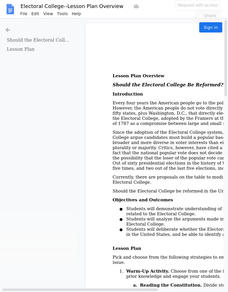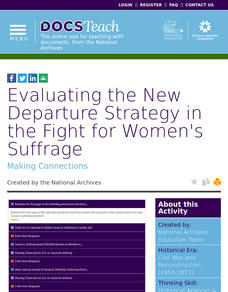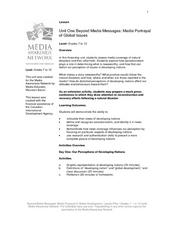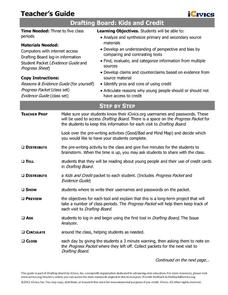National Endowment for the Humanities
The House Un-American Activities Committee
Was the House Un-American Activities Committee justified in investigating subversive influences in the entertainment industry? Part two of the three-part series of lessons that examine the anti-communism movement after World War II,...
DocsTeach
To What Extent was Reconstruction a Revolution? (Part 1)
Some scholars consider the Civil War and Reconstruction a second American Revolution. Class members weigh in after examining primary sources, including a Congressional resolution calling for the Fifteenth Amendment and the credentials of...
Read4Health
Piggybook: A Read4Health Lesson Plan
"You are pigs." With those three simple words, the lives of the Piggott family were changed forever. Read aloud the children's story Piggybook by Anthony Browne and teach your class the importance of personal responsibility,...
National Endowment for the Humanities
Lesson 1: The United States Confronts Great Britain, 1793–1796
After the Revolutionary War, the success of the United States was far from guaranteed. Foreign powers coveted the new land, and Great Britain challenged American sovereignty. Learners consider the challenges facing the new nation using...
C-SPAN
Electoral College
Most people are surprised to learn that American democracy is not as direct as they thought. Using a package of guiding questions, charts and curated videos, learners unpack the unique American institution of the Electoral College. The...
Syracuse University
Women's Suffrage Movement
Women gained the right to vote in the twentieth century, but the fight for equality dates back centuries. Using an invitation to an 1874 suffrage convention, eager historians consider the motivations behind supporters of the suffrage...
Curated OER
Witch Hunt or Red Menace? Anticommunism in Postwar America, 1945-1954
Learners investigate the goals and methods of the House Un-American Activities Committee and offer an opinion regarding whether their investigation of Hollywood was justifiable.
National Endowment for the Humanities
Ending the War, 1783
The various peace proposals, made by both sides, to end the Revolutionary War come under scrutiny in this final lesson of a three-part series on the war. Class members read primary source documents and compare them with military...
National Endowment for the Humanities
Lesson 3: Britain, Napoleon, and the American Embargo, 1803–1808
While the French were once the allies of Americans, the Napoleonic Wars saw the United States almost drawn into a war with its one-time friend. Wars in Europe threatened to draw in the early republic. A primary source-based activity...
DocsTeach
Evaluating the New Departure Strategy in the Fight for Women's Suffrage
When women demanded their right to vote, did the Constitution already protect it? The New Departure Strategy in the women's suffrage movement made this claim through court hearings. Using documents, such as transcripts from Susan B....
Curated OER
Beyond Media Messages: Media Portrayal of Global Issues
Take a close look at news reporting techniques and global issues. Begin by creating a graphic representation of developing nations and defining the term. After class discussion, the second day's activities pick up by deconstructing news...
Curated OER
Scapegoating and Othering
Scapegoating and "Othering" is the focus of a series of activities that ask groups to consider how these behaviors contribute to hatred and intolerance. Groups are given a scenario and discussion questions based on the situation. Whether...
Constitutional Rights Foundation
Plyler v. Doe: Can States Deny Public Benefits to Illegal Immigrants?
Illegal immigration is an ever-changing source of consistent controversy. A reading passage about the rights of undocumented workers and illegal immigrants—and the lack thereof—guides high schoolers into a mock trial activity. Three...
Smithsonian Institution
A Ticket to Philly—In 1769: Thinking about Cities, Then and Now
While cities had only a small fraction of the population in colonial America, they played a significant role in pre-revolutionary years, and this was certainly true for the largest city in the North American colonies: Philadelphia. Your...
iCivics
Drafting Board: Kids and Credit
Should kids under the age of 18 be given access to credit cards? Learners identify pros and cons of using credit, develop claims based on evidence, and finally argue reasons for or against credit for minors.
National Endowment for the Humanities
Lesson 2: The United States, France, and the Problem of Neutrality, 1796–1801
While the French Revolution could be considered inspired by the American Revolution, it created thorny problems for the new United States. Should the United States get involved and be drawn into a European drama? Was the US strong...
Curated OER
Lights Out on Broadway
How do you write arguments that articulate the views of opposing sides? Through concentrated research, investigation, and critical analysis, leaners become more knowledgable on the opposing argument. The class fills in a KWL graphic...
Curated OER
Rights of the Accused in Search and Seizure
Young scholars explain the rationale behind the Fourth Amendment, and the types of activity regulated by the Constitution. They analyze situations, and explain a citizen's rights when an unlawful search or seizure is conducted.
Advocates for Human Rights
Deliberative Dialogue
How do you create a classroom environment where hot button topics may be discussed in a respectful manner? As part of a series of lessons that focus on immigration issues, class members examine the rules for civil discussion before...
National Endowment for the Humanities
The War in the North, 1775–1778
Using primary source documents, including maps, learners examine Revolutionary War events from 1775 to 1778. The focus here is on the challenges George Washington and the Continental army faced and how they persevered in spite of those...
Curated OER
Building Character: Holocaust Survivor Testimonies
Host a fishbowl discussion to help your class recognize and articulate the relationship between words and the character traits they describe. They analyze Holocaust survivor testimonies and apply the character traits they observe. No...
American Documentary
American Aloha: Hula Beyond Hawai'i
In this lesson, young scholars will examine Hawaii's issues of colonization, authority, authenticity and cultural identity, and understand the distinction between native and non-native Hawaiians. This lesson includes links to videos,...
Curated OER
Ahimsa and Making Nonviolent Choices with Gandhi and King
Students investigate nonviolent lifestyles by researching the biographies of Martin Luther King Jr and Gandhi. In this peace lesson, students define the term Ahimsa and describe Gandhi's lifestyle. Students identify the six...
National Endowment for the Humanities
Lesson 2: The Debate in Congress on the Sedition Act
Pupils research and discuss the provisions in the Constitution that supported the arguments for and against the Sedition Act. They articulate objections to and arguments in favor of the Sedition Act.























